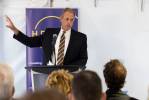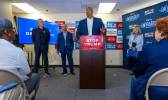Trump outlines plan to privatize air traffic control system
WASHINGTON — President Donald Trump announced Monday an initiative to reform the nation’s air traffic control system, which he said is woefully behind the times.
“At a time when every passenger has GPS technology in their pockets, our air traffic control system still runs on radar and ground-based radio systems that they don’t even make anymore, they can’t even fix anymore, and many controllers must use slips of paper to track our thousands and thousands of planes that are up in the air,” Trump said.
The president wants to set up a private not-for-profit corporation to govern America’s air traffic control and bankroll efforts to modernize the system with Next Generation technology. He announced the initiative in the White House East Room before a crowd that included former Transportation secretaries and enthusiastic Republican lawmakers.
Air travel in 2016 has produced a number of passenger horror stories – most notably United Airlines’ forced removal of a passenger to accommodate traveling crew members at O’Hare International Airport. Trump argued that updating air traffic control should cut down on needless delays and improve the flying experience.
The present air traffic control system was born, Trump said, “when roughly 100,000 people flew at our airports each year.” With the number of U.S. passengers nearing 1 billion, the system cannot keep up — needless delays cost the U.S. economy “as much as $25 billion a year in economic output.”
Trump cited Nav Canada, a privately run not-for-profit corporation founded in 1996 to run Canada’s air traffic control system, as a model for his plan.
The proposal, which would require congressional approval, is opposed by many Democrats.
Rep. Dina Titus, D-Nevada, slammed the idea as “an ill-conceived scheme to hand over our air traffic controls system to a corporate board without any congressional oversight.”
Titus also warned that the Trump plan could hurt Las Vegas’ vital tourism industry. “With this bad deal, the public will get nothing in return for forking over billions of dollars’ worth of federal equipment and control of our skies to special interests.”
Her office sent out a 2016 report from the Congressional Budget Office that estimated a similar plan would add to the federal deficit by $20 billion over 10 years.
Consumer advocate Ralph Nader warned that Trump’s proposal is “too vague, too whoopee and might become a dream for global hackers.”
But the nation’s airlines mostly back the plan.
“Recognizing that details are still to be worked out, we’re in favor of the concept and supportive of its potential to make the system more efficient for travelers,” said Hilarie Grey, a spokeswoman for Las Vegas-based carrier Allegiant Travel Co.
The Obama administration spent about $1 billion annually on the FAA’s modernization program, Next Generation. That wasn’t money well spent, according to Trump who said, “Honestly, they didn’t know what the hell they were doing.”
The president’s current budget proposal would cut transportation spending by 13 percent. Trump’s plan offers a way around those cuts by allowing the government to increase spending on air traffic by levying fees for aviation users.
“This is where I do not get the opposition,” observed Cato Institute Director of Tax Policy Chris Edwards. “Washington is getting even more dysfunctional. There’s not going to be a lot of money around in the future to pump up air traffic control.”
Review-Journal Staff Writer Art Marroquin contributed.
Contact Debra J. Saunders at dsaunders@reviewjournal.com. Follow @debrajsaunders on Twitter.
































